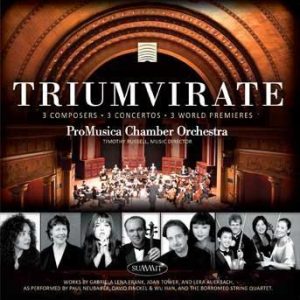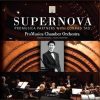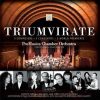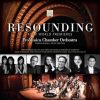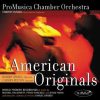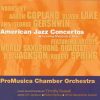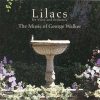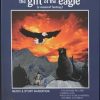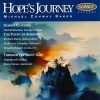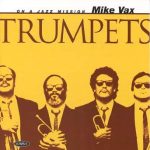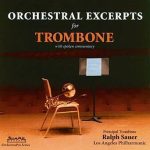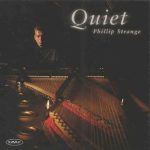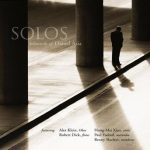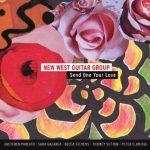Triumvirate – ProMusica Chamber Orchestra
Cellist David Finckel and Pianist Wu Han Named MUSICAL AMERICA 2012 Musicians of the Year
World Premiere Recordings of three new concertos by Joan Tower, Gabriela Lena Frank, and Lera Auerbach. ProMusica Chamber Orchestra’s 11th CD release features the world premiere recordings of three new concertos by three world renowned composers of today – Joan Tower, Lera Auerbach,and Gabriela Lena Frank.
One of the works is a solo concerto, Tower’s Purple Rhapsody, featuring violist Paul Neubauer, followed by a double concerto, Frank’s Compadrazgos featuring power duo pianist Wu Han and cellist David Finckel. The final work Auerbach’s Fragile Solitude, written for string quartet and chamber orchestra, featuring the Borremeo String Quartet. All three of these works were commissioned by the award-winning ProMusica Chamber Orchestra, and was recorded at the Southern Theatre in Columbus, Ohio under the baton of music director Timothy Russell.
Since its founding in 1978, ProMusica has been recognized for excellence for its presentation of the best of traditional chamber orchestra repertoire and the development and appreciation of contemporary American music. ProMusica has commissioned over 55 new works and has presented 60 world and 48 regional premieres. The orchestra has won eight awards from the American Society of Composers, Authors, and Publishers (ASCAP) for adventurous programming, and continues an active recording program.
1-4) Compadrazgo for Piano, Cello, and Chamber Orchestra (2006) [26:59]
Gabriela Frank
David Finckel, cello Wu Han, piano
5) Fragile Solitudes: Shadowbox for String Quartet and Chamber Orchestra (2008) [23:11]
Lera Auerbach
The Borromeo String Quartet
6) Purple Rhapsody for Viola and Orchestra (2005) [19:03]
Joan Tower
Paul Neubauer, viola
”Triumvirate features three new – and very different – works, all by living American women, commissioned by the Columbus, Ohio-based ensemble…. Composed in 2007, Gabriela Lena Frank’s Compadrazgo takes its title from a Latin American trait which the composer describes as signifying ‘a special kind of camaraderie such as the bond between a godparent and godchild or the friendliness between neighbors who might borrow sugar from one another.’ Here, the four-movement work, played by husband-and-wife cellist David Finckel and violinist Wu Han, for whom the piece was written, explores the various permutations of relationships between the solo instruments and the orchestra. At 27 minutes playing time it is the longest of the three works here, and begins in high spirits with motivic elements drawn from the folk music of the Andean mountains of Peru and Bolivia adding delightful piquancy to a darting, dancing musical conversation in which cello and piano jostle playfully for position. Paying homage to the wind-blown plains of northern Peru, the ‘Scherzo para Sip·n’ is shot through with darker, more mysterious hues inked in by some strikingly evocative writing for both solo instruments and orchestra, with an altogether otherworldly effect from what sounds like softly struck and muted cymbals that mimics a breath being exhaled.
Taking its title from a ‘beautiful and barren’ island in Lake Titicaca, the ‘Adagio para Amantani’ takes the form of an extended, hushed and intimate cadenza for rippling piano and ruminative cello alone. In sharp contrast, the finale, ‘T’inku’ (a curiously counterintuitive manifestation of compadrazgo that takes the form of a ritualistic fight) justifies the bristling combative spirit by bringing the mock-feud to a cohesive conclusion.
Lera Auerbach’s Fragile Solitudes (Shadowbox) deftly places the Borromeo String Quartet in the soloist’s chair in a conceit that can trace its lineage as far back as Handel and Corelli. It’s as much an exercise in technique and style, as in expressiveness, but on all three counts it succeeds. Structured in 11 through-played sections, it’s a work of overlapping chiaroscuro contrasts in which the blended, lyrical, quietly romantic (if also occasionally drunken-sounding) voice of the string quartet is variously complemented by and collides with orchestral writing distinguished by moments of vinegary astringency, agitated insistency, disconcertingly tremulous accompaniment, and delicious theatrical asides.
Whatever Auerbachs unrevealed programmatic intentions may have been – a query the implied and intriguing narrative of the now hypnotically dreamy, now driven and dynamic music can-t help but invite – the piece succeeds by sheer force of musical imagination. Particularly impressive is her obvious but adroitly employed gift for grammatical nuance, the 23-minute-long work making often subtle, sometimes dramatic use of contrasted dynamics, tempi, pitch, and sonorities to punctuate and point to altogether beguiling effect.
It draws from the Borromeo players and the orchestra ensemble playing of atmospheric intensity and, under music director Timothy Russell-s beautifully measured and articulated pacing, a sensitive and subtle reciprocity that is all too rare.
The oldest work is Joan Tower’s Purple Rhapsody, a 19-minute, single-movement concerto for solo viola. Dating from 2006, it is, as the title suggests, rhapsodic in nature, but it also carries itself with all the muscle (and not a little of the menace) of a Bernard Herrmann film score, and calls to mind, not least in the seething, searing, slicing writing for the solo instrument, Bartók at his most dyspeptic.
With orchestral forces thinned out – horns and oboes are noticeable by their absence – and Tower cleverly backfilling the space they leave with imaginatively vigorous writing for the viola, it forefronts Paul Neubauer’s by turns energetic, exercised and ecstatic playing to palpably dramatic effect. In all, it’s a satisfyingly intense and demanding listen, and one that soloist and orchestra negotiate with gladiatorial prowess.”
-The Classical Review
If you are interested in purchasing an individual track from this cd, visit ![]()



